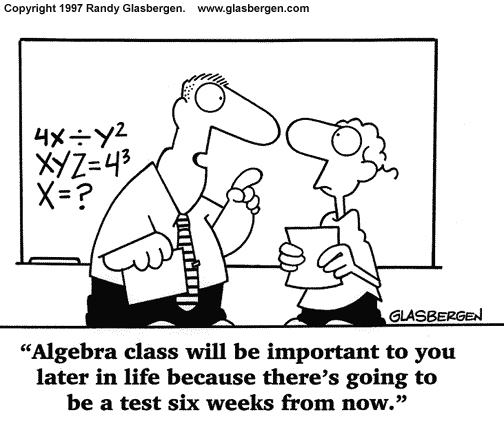
Outside of the basic math concepts (addition, subtraction, multiplication, and division), I feel like my math career has been a lot of short term learning. I remember learning topics in math, doing well on the tests, then forgetting most of what I learned. In younger grades, I was one of the best in my class at math. I would fly through math worksheets and ace tests. As I reached higher grades, math became much more difficult. In particular, I struggled with problem solving, which was practiced in almost every math class. This was peculiar because I was a good reader and loved words. Language Arts was my specialty, but something about the combination of generating an equation or formula from a confusing riddle was frustrating. Somehow, I still managed to do well and keep A's and B's throughout my whole math career. Unfortunately, I know it's because I was memorizing... not understanding.
As the years progressed, my confidence in math dwindled. In younger grades, math was fun - bright, colorful, and full of fun materials. I mean, we played math games, built towers, used various math materials such as geometric shapes, and so on. It was noticeable that my math teachers in younger grades put effort into making math interesting and stimulating. In higher grades, there was no concern for this. Math became dull and repetitive. The concepts became more challenging and the teachers were less patient and understanding. If you weren't a top math student in the class, it was almost as if teachers cared less about you. I can even remember pretending to complete assigned math work and lying about being finished - praying that the teacher wouldn't call on me to answer a question out loud. I think this was mainly due to pressure from the math teachers and peers in class. Those who weren't experts at math were terrified to be humiliated - both by the teacher and students. For this reason, I think it's important that math class offers a safe and comfortable working environment.
When I look back at my math career, one thing I'm thankful for is the fact that I had parents at home who could help me learn math concepts before tests and complete math homework. If it wasn't for this privilege, I would not have been nearly as successful in math. It was not enough for me to be given a math problem on the board in class and be expected to master it. I needed to practice concepts at home. The sad reality is that there's an abundance of students who don't have the help they need outside of school. Because of this, I would like to be able to offer some sort of after school math help for my students in the future.
After high school, I completed math 1090 and math 1000 in Grenfell in Corner Brook. As I did 1090 first, I was not required to write a math placement test upon my entry into Grenfell (this was why I did 1090 first). Those who immediately entered math 1000 had to do the placement test - I had way too much anxiety about the test to even consider this route. I did fairly well in both math courses, scoring above 75, which I was happy with considering math was not my forte. I have heard that math courses in St. John's were much more difficult than those in Corner Brook. My professor in Grenfell was phenomenal. She sort of spoon fed us, giving us which problems would be on the tests and teaching concepts step by step so those having difficulty could follow along and understand. This was the type of instruction I needed in order to be successful in university math.
Currently, my feelings about math are pretty neutral. I have had good experiences and bad experiences. The bad experiences have made me want to be a more caring and considerate math teacher. I have been bartending downtown in St. John's for a number of years and calculating tabs, sales, and change has been the only math that I have seen in the past 3 years. I am looking forward to getting back into the math groove and revisiting many of the math concepts that I have forgotten many years ago.
No comments:
Post a Comment